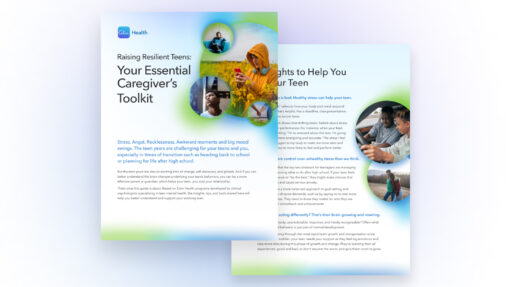Clinically reviewed by Chris Mosunic, PhD, RD, MBA, Chief Clinical Officer, Calm
Employee engagement isn’t the only thing on the decline. Workers, especially older managers and female managers, are feeling worse about their lives, according to Gallup’s global state of the workplace survey. In fact, the overall well-being of older managers and female managers fell by five and seven percentage points in 2024, respectively, hitting historic lows in the US and Canada.
The report points to housing costs and inflation as potential reasons for workers’ declining evaluations of their lives, based on the survey respondents’ dissatisfaction with income. An additional stressor, however, may be the escalating teen mental health crisis, which likely would affect older managers and female managers most. A growing number of teens and their working parents are struggling with mental health challenges.
Teen mental health has worsened in the past decade
According to the CDC’s Youth Risk Behavior Survey, despite progress in some areas of teen health, including substance use and sexual risk behaviors, many indicators of teen mental health and well-being have worsened over the past decade. For example,
- About 40% of teens (53% of girls and 28% of boys) reported persistent feelings of sadness/hopelessness in 2023, up from 30% in 2013;
- 20% of high school students seriously considered suicide in 2023, up from 17% in 2013; and
- Roughly 1 in 5 children ages 3 to 17 has been diagnosed with a mental health condition, such as anxiety, depression, or a behavioral disorder.
Parents of teens need support. Start with our toolkit offering helpful insights and tips!
Get the toolkit
Children’s mental health challenges affect parents at work
Caring for a teen with anxiety, depression, or other mental health disorders can take a heavy toll on the emotional and mental health of parents. In fact, working parents of a teen with mental health challenges are more likely to struggle with their own mental health challenges, regardless of the cause. They’re also more likely to feel stressed, lonely, and less productive than working parents of children without mental health challenges.
Indeed, teen mental health challenges negatively affect parents at work. According to a study by Nationwide Children’s Hospital,
- More than half of working parents (53%) have missed work at least once a month to address their children’s mental health,
- More than half of working parents (54%) have interrupted their work to respond to communication about their child’s behavioral health needs, and
- Up to half of working parents think about their child’s mental health and well-being while at work.
Without sufficient support, parents caring for teens with mental health concerns may face prolonged stress, which leaves them vulnerable to burnout or even having to step away from their jobs.
Working parents of youth with mental health challenges want a more supportive workplace culture
HR leaders might believe their programs and policies provide adequate mental health support for both parents and their teens. Counseling sessions available through the organization’s EAP can be an important resource, for example. Flexible work arrangements can help parents better manage their teen’s busy schedule and accommodate therapy appointments. And when they need to, parents can take time off under the Family Medical Leave Act to care for a child’s mental health.
But parents of distressed teens want more support from their employers, including access to virtual care, a strong provider network, and services to help their child deal with stress.
They also want a more supportive workplace culture, which suggests they want to feel safer opening up about what they and their teens are going through. The Nationwide Children’s Hospital study showed that 85% of working parents think it’s a good idea to talk about their children’s mental health, but only about 20% talk to their managers, human resources representatives, or peers at work, which likely contributes to their stress and loneliness.
How employers can better support the mental well-being of parents caring for teens
Clearly, employers can do more to combat stigma and create a psychologically safe workplace culture. A report by Making Caring Common, a project of the Harvard Graduate School of Education, suggests parents need
- Guidance in supporting their teens’ mental health, including basic education about teen anxiety and depression and when and where to turn for help;
- Guidance in managing their own anxiety when their teens are anxious or depressed; and
- Support for understanding their own symptoms of depression and anxiety and help alleviating them.
A new program from Calm Health supports parents of teens with mental health challenges
A new Calm Health program fills this important gap in employer benefits plans. Developed by licensed clinical psychologist Dr. Alise Conner, Parenting Teens with Mental Health Conditions is a 12-session program that shares practical tools parents can use every day to support their teen’s mental health and feel calmer and more confident as a parent.
The episodes provide important education and guidance about teen mental health to help parents take appropriate steps to support their teen. Parents also learn evidence-based strategies from behavioral therapy and mindful parenting, with specific techniques they can use in their daily interactions with their teen. Throughout the program, parents are reminded that there’s no such thing as a perfect parent, that they’re not alone, and that caring for themselves is critical—they can be a supportive, caring, and attentive parent and take time for themselves.
The 12 sessions of Parenting Teens with Mental Health Conditions:
- “A Fresh Start for You and Your Teen”
- “Learn the Mental Health Landscape”
- “Taking Care of Yourself as a Parent”
- “Creating a Stable Environment”
- “Your Relationship with Your Teen”
- “Reframe Your Expectations”
- “The Basics of Being a Mindful Parent”
- “How to Navigate Big Emotions”
- “Managing Problem Behaviors”
- “Problem-Solving with Your Teen”
- “The Power of Sleep”
- “How to Respond to Your Teen in a Helpful Way”
Additional support for families with mental health challenges
For more support for parents and teens in your workforce, explore additional evidence-based programs on Calm Health, including Parenting Teens: Growing and Changing Together, Inclusive Parenting for LGBTQ+ Youth, Taking Charge of Your Teen Anxiety, Teen Guide to Taking on Depression, and Managing ADHD Effectively as a Teen. Calm Health is now available for teens ages 13 and older.
Also check out more Calm Health blogs and materials related to teen and parent mental health:
Blog Posts
- “Supporting the Mental Health of Teens Starts with Supporting Parents”
- “Understanding and Supporting Teen Mental Health”
- “Supporting the Mental Health of LGBTQ+ Employees and Dependents”
Guides
- Raising Resilient Teens: Your Essential Caregiver’s Toolkit
- Teen and Family Mental Health Research Report
Calm Health is a mental health wellness product. Calm Health is not intended to diagnose or treat depression, anxiety, or any other disease or condition. Calm Health is not a substitute for care by a physician or other healthcare provider. Any questions that you may have regarding the diagnosis, care, or treatment of a medical condition should be directed to your physician or healthcare provider.




